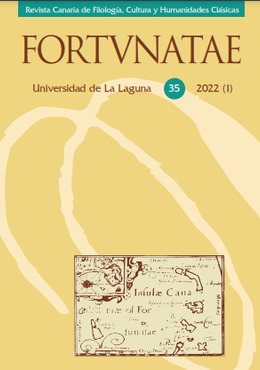El amor por la vida o la muerte por la comunidad: la φιλοψυχία en Grecia clásica
Resumen
Aunque, al parecer, Tirteo fue el primer autor griego que utilizó el término φιλοψυχία, no fue sino hasta época clásica que volvió a aparecer, aunque de forma muy escasa; específicamente se encuentra en Eurípides, en Heródoto, en algunos oradores y en Platón. Este concepto se utilizó de forma negativa, por lo que más que ‘amor a la vida’ (significado etimológico), se traduce como ‘apego a la vida’. Este uso parece extraño dado el placer por vivir que esa sociedad tenía y expresaba en sus acciones cotidianas, como en los banquetes. En este artículo, se analizará el uso de dicho vocablo en su respectivo contexto para entender ese uso negativo y, al mismo tiempo, se profundizará en lo fundamental que resultaba la vida en comunidad frente a la existencia particular en esta época griega.
Citas
Antología de la poesía lírica griega. Siglos VII-IV a. C. (1980): ed. C. GARCÍA GUAL, Alianza, Madrid.
ARISTÓTELES (1978): Acerca del alma, trad. T. CALVO MARTÍNEZ, Gredos, Madrid.
ARISTÓTELES (1985): Ética Nicomáquea, Ética Eudemia, trad. J. PALLÍ, Gredos, Madrid.
ARISTÓTELES (1999): Retórica, trad. Q. RACIONERO, Gredos, Madrid.
Carmina epigraphica graeca (CEG), Vol. 2, Saeculi IV a. Chr. n. (1989): ed. P. A. HANSEN, De Gruyter, Berolini. DEMÓSTENES (1985): Discursos políticos III, trad. A. LÓPEZ EIRE, Gredos, Madrid.
Elegíacos griegos (2012): trad. E. SUÁREZ, Gredos, Madrid.
ESTRABÓN (2008): Geografía. Libros VIII-X, trad. J. J. TORRES, Gredos, Madrid.
EURÍPIDES (1991): Tragedias I (El Cíclope, Alcestis, Medea, Los Heraclidas, Hipólito, Andrómaca, Hécuba), trad. Alberto MEDINA GONZÁLEZ y Juan Antonio LÓPEZ FÉREZ, Gredos, Madrid.
EURÍPIDES (1998): Tragedias III (Helena, Fenicias, Orestes, Ifigenia en Áulide, Bacantes, Reso), edición bilingüe, trad. C. GARCÍA GUAL y L. A. DE CUENCA Y PRADO, Gredos, Madrid.
HERÓDOTO (1977): Historia. Libro I. Clío, int. F. R ADRADOS, tradd. C. SCHRADER, Gredos, Madrid.
HERÓDOTO (1981): Historia. Libro VI. Érato, trad. C. SCHRADER, Gredos, Madrid.
HOMERO (1991): Ilíada, trad. E. CRESPO, Gredos, Madrid.
HOMERO (2007): Odisea, trad. J. M. PABÓN, Gredos, Madrid.
ISÓCRATES (2007): Discursos, trad. J. M. GUZMÁN, Gredos, Madrid.
JENOFONTE (1993): Recuerdos de Sócrates, Económico, Banquete, Apología de Sócrates, trad. J. ZARAGOZA, Gredos, Madrid.
LICURGO (2000): Oradores menores. Discursos y fragmentos, trad. J. M. GARCÍA, Gredos, Madrid.
LISIAS (1988): Discursos I, trad. J. L. CALVO, Gredos, Madrid.
ORADORES MENORES. DISCURSOS Y FRAGMENTOS (2000): trad. J. M. GARCÍA, Gredos, Madrid.
PÍNDARO (1984): Odas y fragmentos, trad. A. ORTEGA, Gredos, Madrid.
PLATÓN (1981): Diálogos I (Apología, Critón, Eutifrón, Ion, Lisis, Cármides, Hipias menor, Hipias mayor, Laques, Protágoras), trad. J. CALONGE et al., Gredos, Madrid.
PLATÓN (1987): Diálogos II (Gorgias, Menéxeno, Eutidemo, Menón, Crátilo), trad. J. CALONGE, Gredos, Madrid. PLATÓN (1986): Diálogos IV (República), trad. C. EGGERS, Gredos, Madrid.
PLATÓN (1999): Diálogos VIII (Leyes, libros I-VI), trad. F. LISI, Gredos, Madrid.
PLATÓN (1999): Diálogos IX (Leyes, libros VII-XII), trad. F. LISI, Gredos, Madrid.
SÓFOCLES (1981): Tragedias, trad. A. ALAMILLO, Gredos, Madrid.
TUCÍDIDES (1990): Libros I y II, trad. J. J. TORRES, Gredos, Madrid.
BERNABÉ, A. - F. CASADESÚS (coords.) (2008): Orfeo y la tradición órfica. Un reencuentro. I y II, Akal, Madrid. BREMMER, J. N. (2002): El concepto del alma en la antigua Grecia, trad. Menchu GUTIÉRREZ, Siruela, Madrid.
BURGALETA, F. J. (2004): «El animal en la fiesta griega antigua: el sacrificio animal de consumición», en V. SÁNCHEZ y J. RUIZ (coord.), La religiosidad popular y Almería. Actas de las III Jornadas, pp. 255-265.
CURRIE, B. (2005): Pindar and the Cult of Heroes, University Press, Oxford.
GARCÍA ÁLVAREZ, C. (2014): «Un estudio sobre el género en la tragedia griega (logos, polis y genos)», Bizantion Nea Hellás 33: 67-83.
HUMPHREYS, S. C. (1982): The family, women and death. Comparative Studies, Routledge & Kegan Paul, London et al.
IRIARTE, A. (1996): Democracia y tragedia: la era de Pericles, Akal, Madrid.
LACEY, W. K. (1968): The Family in Classical Greece, Thames and Hudson, London.
LICHT, H. (1932): Sexual Life in Ancient Greece, trad. J. H. FREESE, M. A., ed. Lawrence H. DAWSON, Routledge & Kegan Paul, London.
LORAUX, N. (1989): Maneras trágicas de matar a una mujer, trad. R. BUENAVENTURA, Visor, Madrid.
PLÁCIDO, D. (2000): «La presencia de la mujer griega en la sociedad: democracia y tragedia», Stud. Hist., Historia Antigua 18: 49- 63.
RODRÍGUEZ ADRADOS, F. (1995): Sociedad, amor y poesía en la Grecia Antigua, Alianza Universidad, Madrid. RUBIERA, C. (2011): «Mujeres y hombres como víctimas de sacrificio en las Tragedias de Eurípides. Lecturas desde el género», Arys 9: 99-118.
SEBILLOTTE, V. (2004): «La sexualité et le genre. Une histoire problématique pour les hellénistes. Détour par la “virginité” des filles sacrifiées pour la patrie», Metis 2: 137-161.
SEBILLOTTE, V. (2015): «Regímenes de género y Antigüedad griega clásica (siglos V-IV a.C.)», trad. M. MUÑOZ, ed. Ana IRIARTE, Revista de Historiografía 22: 51-88.
VERNANT, J.-P. (1992): Los orígenes del pensamiento griego, Paidós, Barcelona.
VERNANT, J.-P. (2001): El individuo, la muerte y el amor en la antigua Grecia, trad. Javier PALACIO, Paidós, Barcelona.
VERNANT, J.-P. et al. (1993): El individuo griego, ed. J.-P. VERNANT, Alianza, Madrid.
Los autores conservan los derechos de autor y garantizan a la revista el derecho de ser la primera publicación del trabajo al igual que licenciarlo bajo una Creative Commons Attribution License que permite a otros compartir el trabajo con un reconocimiento de la autoría del trabajo y la publicación inicial en esta revista.
Los autores pueden establecer por separado acuerdos adicionales para la distribución no exclusiva de la versión de la obra publicada en la revista (por ejemplo, situarlo en un repositorio institucional o publicarlo en un libro), con un reconocimiento de su publicación inicial en esta revista.





